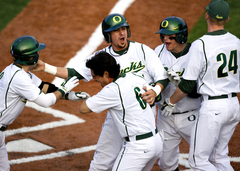
The Lineup

 The Starters
The Starters
 The Park
The Park
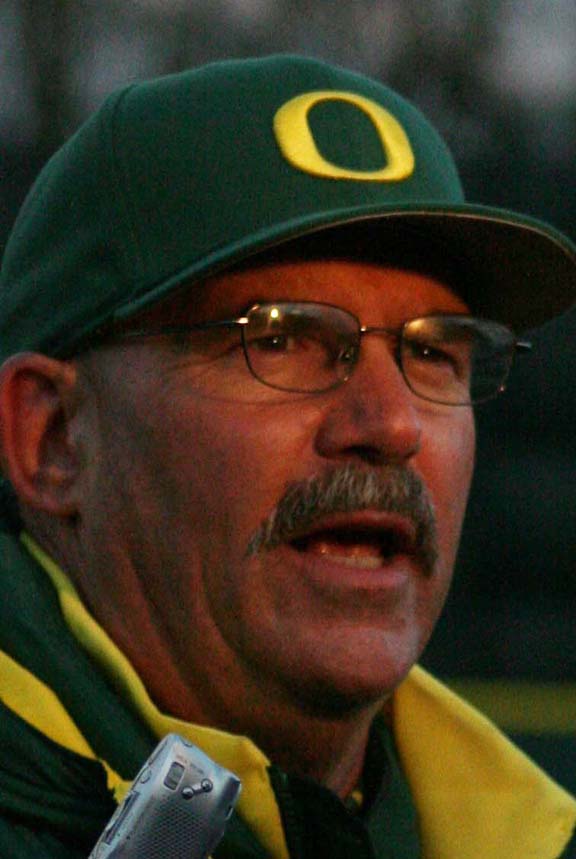 The Coach
The Coach
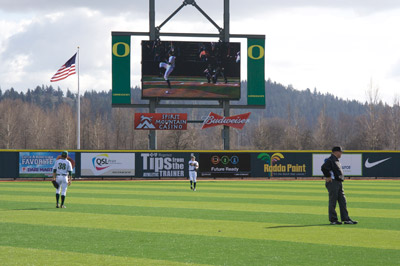 The Beginning
The Beginning
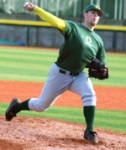 The Reliever
The Reliever
Geoff Nichols brings the heat back to Oregon
One relief pitcher's unique journey to Oregon baseball
|
Geoff Nichols, Oregon Ducks Reliever  Photo by Amanda Miles. |
Geoff Nichols' hands can create soothing, melodious music or leave batters astonished, scratching their heads. His fingers, as long as an average man's entire hand, completely engulf a baseball when he wraps his palm around it. These enormous digits provide Nichols with the mastery to manipulate the trajectory of a baseball with enough precision at almost 90 mph to leave some of college baseball's best hitters whiffing.
Nichols, a piano player as long as he's been a baseball player, believes his connection with music has improved the mental aspect of his game, teaching him lessons in concentration and hand-eye coordination. "Performing at a recital provides more pressure than any baseball game ever has for me," says Nichols.
From the outside, you would never guess that anything could faze this confident, clean-cut athlete. His towering 6'5" frame gives him the ideal pitcher's body-long enough to provide a good reach toward home plate without becoming too gawky. Ever since high school, Nichols has been compared to Portland Trailblazers' center Joel Pryzbilla. Everything from the chiseled face, blonde hair, lengthy frame and infectious smile match Pryzbilla's, and during Nichols' high school years in Portland the similarities were pointed out regularly. Nichols experienced a slight break from the reminders of his uncanny resemblance while he attended the University of Washington on a baseball scholarship.
Nichols' desire to play Division I baseball emerged when he was a sophomore on his high school varsity team, but he did not realize his potential as a pitcher until he was at a Baseball Northwest Showcase his junior year. Pitchers typically have one inning to impress scouts before another pitcher steps onto the mound, but after Nichols led off the showcase, the directors asked if he would like to keep pitching. Finally, after Nichols pitched three innings, a Seattle Mariners' scout asked him if he would be interested in playing for the Area Code team. Nichols agreed without knowing anything about the team, but he did some research and discovered that all pitchers who played on this team were almost guaranteed to be drafted by a professional team or receive a college scholarship. Then, Nichols realized he had a future in the game.
|
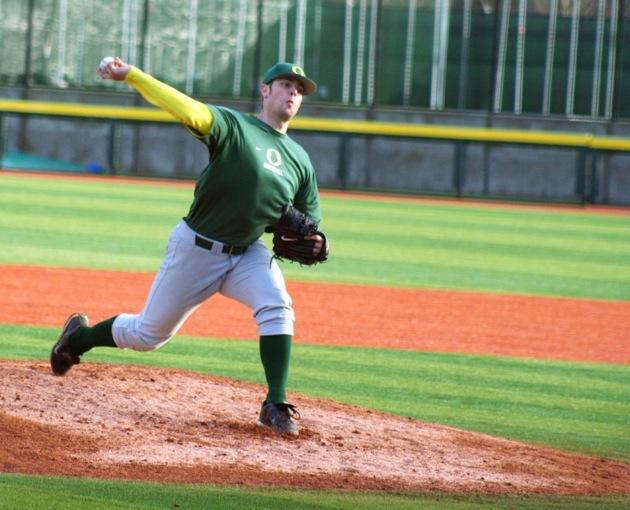 Photo by Amanda Miles. |
As he looked at possible colleges and his chances for a scholarship, he knew he would be surrounded by talent in Washington, but he had no idea of the magnitude until he got there. While playing his freshman year at Washington, Nichols played with Tim Lincecum, winner of the Cy Young Award in just his second season in the major leagues. "He was the most aggressive and fearless pitcher I've ever played with, and he respected the game more than anyone," said Nichols. "I was a young pitcher and I didn't even realize how great he was until later in season, but now looking back on it, playing in his wake had such a great impact on me, and I'm lucky to have had it all unfold while I was there."
Lincecum taught Nichols the value of working as hard as you can and taking pride in yourself and the game in order to become a winning pitcher. So when the University of Oregon announced it would reinstate baseball after 28 years, Nichols knew it was his chance to shine. He transferred his junior year, taking his keyboard with him.
Wearing Lincecum's number, 55, on the Oregon team, Nichols is one of 19 pitchers on the staff. This year's team consists of roughly half transfer students and half freshmen from all over the country, the majority of whom enrolled in the school with the intention of trying out for the team. The school's club baseball team played in the Club World Series just two years ago, yet none of these former players made the roster. Nichols' position in the bullpen places him as a reliever, or "set-up man," primarily used when the scoring margin is close in the fifth to eighth innings.
Composure and fearlessness make up the essential characteristics of a successful reliever, and while Nichols believes he still has room to improve in these areas, he feels confident in his ability to lead by example as one of the only seniors and one of just three players with Division I experience on a team full of young athletes.
Fifteen months ago at the team's first practice, Nichols admitted there was a feeling of tension in the air among this group of athletes who are all the best from their hometowns. However, since then, the coaches have helped the players mesh and learn that the name on the front of the jersey is more important than the one on the back. The beginning of a Division I-level baseball program brought recruits from all over the country but primarily the West Coast, an experience that Nichols calls, "eye-opening."
|
|
"You see a lot of different attitudes depending on where every player is from," said Nichols. "Baseball has a lot of its own chatter, and it really varies from each part of the country. You have the roughneck Northwest attitude, the flair of the SoCal guys with their big arms and big attitudes and some of the confrontational, in-your-face play from the Bay area guys."
"I think by now everyone's on the same page; no one's playing for themselves" said Nichols. "We all had to realize that being part of the Oregon team is bigger than the Bay or Seattle or Southern California."
The team's training started quickly and has not let up in order to make up for what many programs possess in history and routine. But what this callow team lacks in experience, it makes up in enthusiasm shape a program that remained dormant for almost three decades.
"Every guy is the best from where they came from and everyone has an expectation to win," said Nichols. "There are no flukes on this team; no one is here by chance or accident."
For now, only time will determine how this "hit-the-ground-running" approach to training will play out for a new program in one of the nation's toughest conferences.
These days, Nichols doesn't have much time to play the piano. He's too busy making sure that his baseball game is on point. So as the Ducks' season progresses, the only music Nichols hopes to hear will be his pitches smacking a catcher's glove.
